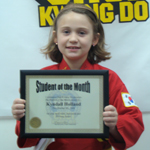MainFrame
Commerce Choi Kwang Do Terminology
Choi Kwang Do is of Korean origin - many of its traditions and customs, as well as terminology, stem from Korea's own heritage.
Characteristics such as bowing, promoting respect for seniors, loyalty, are all examples of traditional Korean philosophy.
Another important historical influence on Choi Kwang Do's philosophy is the Idea of Musado, or "way of the warrior spirit".
This philosophy, emphasizing bravery in battle and a never give up attitude, was based on the heroic deeds of an ancient Korean
military group called the Hwarang Do (literally, flower of youth or manhood).
This elite group, comparable to today's special forces, were known for their self-imposed extreme training, which included
early forms of martial arts training, mountain climbing, and swimming rivers during the cold of winter. Through such demanding
mental and physical training, the Hwarang Do warriors were able to unite the three warring kingdoms of Korea for the first
time in its history.
The Hwarang Do had a strict code of honor, which has evolved to this day to become the Principles of Choi Kwang Do:
Honesty
Gentleness
Perserverance
Self Control
Unbreakable Spirit
Korean Alphabet
As a part of the monthly Instructor training held throughout Georgia, Grandmaster Woo has prepared a tool for
learning the Korean alphabet. For those who can not attend these training sessions we are making the
Korean alphabet document available here:
Download Korean Alphabet Template
Class Commands
Charriot |
Attention |
Kyung Yae |
Bow |
Chun Bi |
Ready |
Sejak |
Begin |
Baro (of Chun Bi) |
Back to Ready |
Goman |
Stop |
Shi Uh |
At Ease |
Koo - Ryung Op See |
In Your Own Time |
Koo – Ryung Ay Machura |
By The Count |
Dwiro Dora |
Turn Around |
Hai Sun |
Dismiss |
Op Uro Gamya |
Move Forward |
Dwi Uro Gamya |
Move Backward |
Bal Ba Kwa |
Switch Stance |
Stances (Sugi)
Chun Bi Sugi |
Ready Stance |
Op Sugi |
Front Stance |
Yup Sugi |
Side Stance |
Anjun Sugi |
Sitting Stance |
Bang Uh Jasae |
Defense Posture (Hands Up) |
Kicks (Chagi)
Op Bal |
Front Leg |
Dwi Bal |
Rear Leg |
Op Chagi |
Front Kick |
Yup Chagi |
Side Kick |
Hullya Chagi |
Swing Kick |
Bandae Hullya Chagi |
Reverse Swing Kick |
Dwi Kum Chi Op Chagi |
Heel Front Kick |
Naeryo Chagi |
Downward Kick |
Bandal Chagi |
Crescent Kick |
Bituro Chagi |
Twisting Kick |
Dolmya Yup Chagi |
Spinning Side Kick |
Dolmya Bandae Hullya Chagi |
Spinning Reverse Swing Kick |
Mikulmyu Chagi |
Sliding Kick |
Twimya Chagi |
Jumping Kick |
Body Sections (Dan)
Ahrae |
Low Area (Below Belt) |
Momtong |
Body (Belt to Shoulders) |
Ulgool |
Face, head, and neck |
Blocks
Ahrae Makki |
Low Block |
Anuro Makki |
Inward Block |
Bakuro Makki |
Outward Block |
Dung Palmok Anuro Makki |
Back Arm Inward Block |
Dwi Sonbadak Ulgool Makki |
Rear Hand Inward Block (Face Level) |
Dwi Sonbadak Momtong Makki |
Rear Hand Body Block |
Pi Ha Gi |
Dodge |
Punches, Thrusts, and Strikes
Jirugi |
Punch |
Op Joomuk Jirugi |
Front (Fist) Punch |
Dwi Joomuk Jirugi |
Rear (Fist) Punch |
Dolya Jirugi |
Round Punch |
Sewo Dolya Jirugi |
Vertical Round Punch |
Olliyo Jirugi |
Upward Punch |
Chirugi |
Thrust |
Sonkut Chirugi |
Finger Thrust |
Chigi |
Strike |
Yup Joomuk Chigi |
Sidefist Strike |
Dung Joomuk Chigi |
Backfist Strike |
Sonkal Chigi |
Knifehand Strike |
Sonkal Dung Chigi |
Reverse Knifehand Strike |
Palkup Chigi |
Elbow Strike |
Mori Chigi |
Head Strike |
Morup Chigi |
Knee Strike |
Sonbadak Chigi |
Palm Heel Strike |
Directions
Op |
Front |
Dwi |
Back or Rear |
Yup |
Side |
Oo |
Right |
Joa |
Left |
Bandae |
Reverse |
An |
Inner |
Bakkat |
Outer |
Dolya |
Turning |
Dora |
(To) Turn |
Uro |
Going Towards a Specific Direction |
For Example: |
|
Bakuro |
Going Outwards |
Anuro |
Going Inwards |
Uro Gama |
(You) Step (Move) in a Certain Direction |
Rank
Gup |
Grade |
Dan |
Degree |
General Terms
Pil Sung |
School Motto: Certain Victory |
Dojang |
The School: House of Discipline |
Do Bok |
Uniform |
Yun Sok |
Combination |
Hyung |
Pattern or Form |
Bang Uh |
Defense |
Jung Sin Yuk |
Mental Strength (Martial Art Spirit) |
Ki Hap |
Loud yell to bring out mental and physical strength |
Sahjonim |
"Founder", Formal address for Grand Master Choi |
Sabumnim |
"Teacher", Formal address for all Instructors |
Choi Kwang-Do |
The Art of Grand Master Kwang Choi |
Tae Kwon-Do |
Korean Art of Kicking and Punching |
Karate |
Martial Art meaning literally "Empty Hand" |
Kung Fu |
Chinese Martial Art meaning "Skill" |
Korean Counting
Hana |
One |
Dool |
Two |
Set |
Three |
Net |
Four |
Tasut |
Five |
Yasut |
Six |
Ilgop |
Seven |
Yodol |
Eight |
Ahop |
Nine |
Yol |
Ten |
Han Bun |
Single |
Doo Bun |
Double |
Sae Bun |
Triple |
Korean Phrases
An Yong Hashimnika |
Hello |
An Yong Hi Kä Sip Seyo |
Goodbye (If you are leaving) |
An Yong Hi Kä Sip Seyo |
Goodbye (To someone who is leaving) |
Da Don Hi Kumopsumnida |
Thank you very much |






